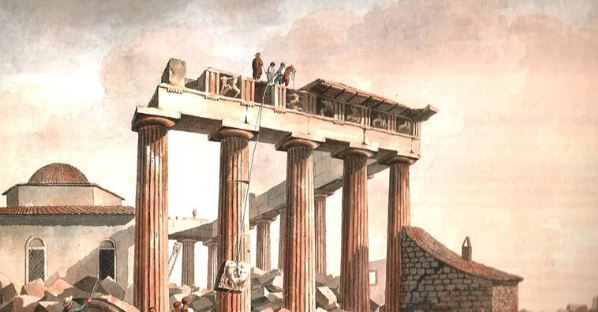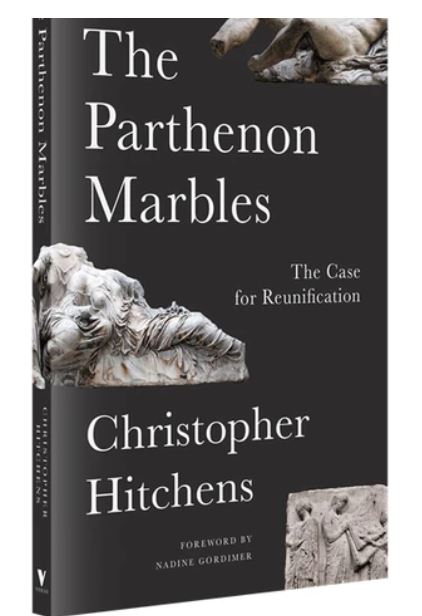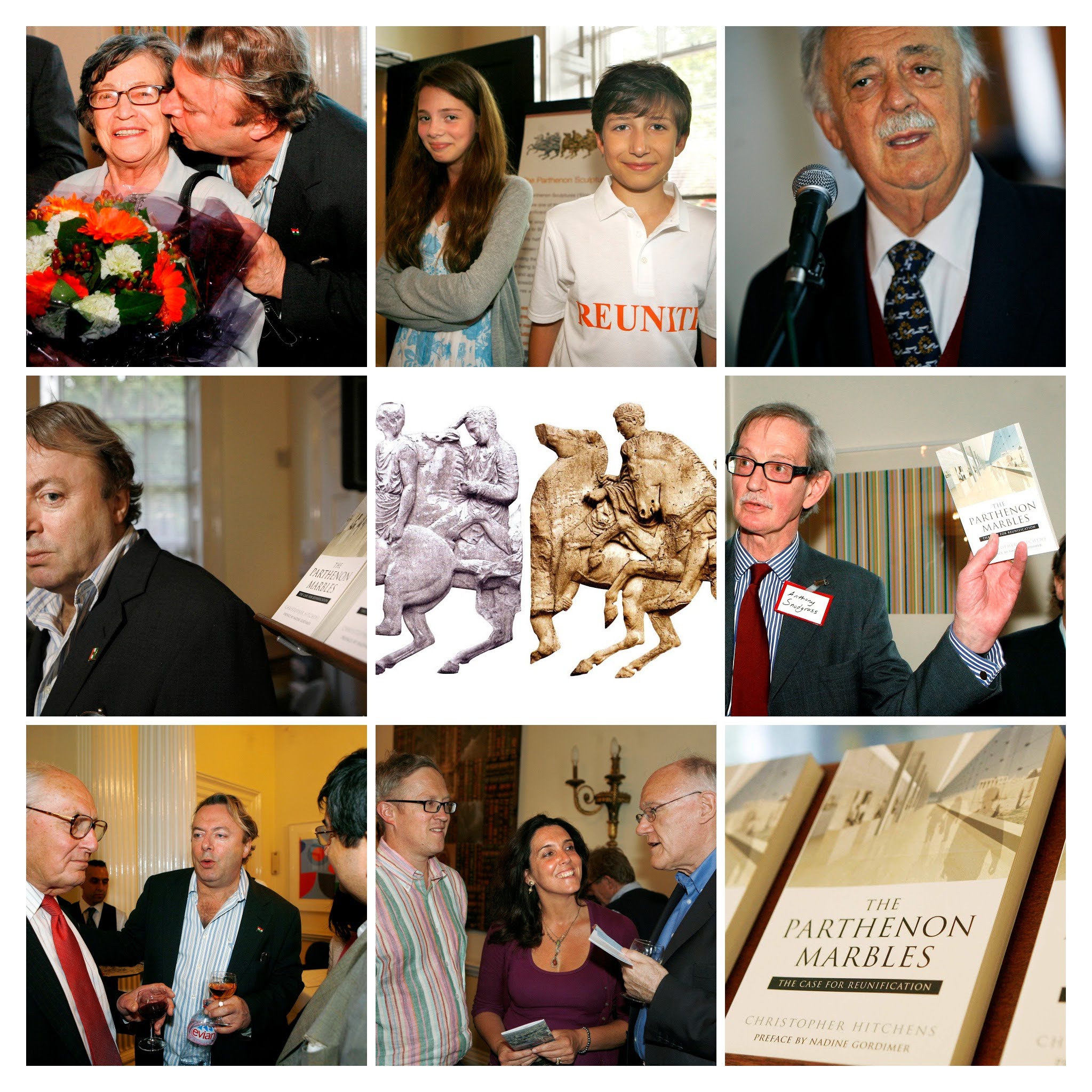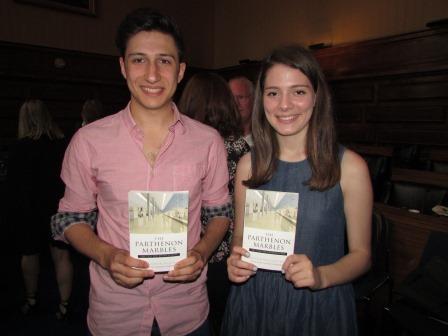'What Christopher Hitchens Understood About the Parthenon. The British Museum should return the ancient treasures to Greece for the sake of art, not nationalism.' Writes Ralph Leonard for The Atlantic.
"Ever since the early 19th century, when Thomas Bruce, seventh earl of Elgin, sawed off and crowbarred many of the carvings that ringed the top of the Parthenon and sold them to the British Museum to dodge bankruptcy, the British have been sharply polarized over whether Britain or Greece has the right to these sculptures. For many liberals and radicals, beginning with Lord Byron, Elgin was a vandal who had committed sacrilege. Yet others maintained that he’d acquired the marbles legally, and even that he’d rescued them from inevitable neglect under the Ottoman empire." Continues Ralph Leonard

"Christopher Hitchens, among the most eloquent and forceful advocates of rejoining the Parthenon marbles, helped tilt me toward the cause of repatriation. With great timing, Verso Books has just reissued his slim book The Parthenon Marbles: The Case for Reunification." Adds Ralph Leonard.

That para transported a few of us to a May day at Chatham House in 2008, a year and a month before the official opening of the Acropolis Museum. On a personal note, meeting Christopher Hitchens was memorable on so many levels but for now will say that what makes his book special and the third edition in particular, is that it is dedicated to James Cubitt, BCRPM's founder and that at the launch George Bizos also a BCRPM member spoke. Timely to have George in London and his words of wisdom as the preface to that edition was written by Nadine Gordimer, plus George through his South African Committee had raised funds for the book too.

Sadly many that gathered at that book launch ae no longer with us and that includes Christopher as well as BCRPM's Hon Secretary Eleni Cubitt, the then Vice-Chair Christopher Priceand the exceptional human rights lawyer George Bizos with historian William St Clair, all pictured above. The two young supporters, Benjamin Godwin (aged 11) and Lucia Mary Bizos (aged 12) pictured at the book launch, in 2016 attended the Commemorative event to mark 200 years from the date in 1816 when the British Parliament voted to purchase from Lord Elgin his collection of sculpted marbles collected from the Parthenon and elsewhere on the Athenian Acropolis. BCRPM held the event at Senate House in June 2016 and both Ben and Lucia were taller by then but they had also read the book, and continue to support the campaign.

"Hitchens’s dedication to this cause wasn’t merely due to a romantic philhellenism rooted in the classical British-private-school curriculum; his life was intertwined with the Hellenic world. As a young socialist and internationalist in the 1970s, he had written and spoken against the Greek military junta that had persecuted his fellow leftists. The independence of Cyprus was among his precious causes, alongside self-determination for the Kurds and the Palestinians—who had long been victims of occupation and imperialist power games. His first wife was a Greek Cypriot, and, as he noted movingly in his memoir Hitch-22, his mother died by suicide in a hotel room overlooking the Acropolis, amid a 1973 anti-junta student uprising. The cause of the Parthenon marbles was therefore both personal and political, emblematic “of a long and honourable solidarity between British liberals and radicals and the cause of a free and independent Greece,” as he wrote in the introduction to the 2008 edition." Writes Ralph Leonard as adds why Christopher Hitchens made his case for repatriating the works almost exclusively on artistic grounds.
The then arguments for keeping the Parthenon Marbles slowly fell by the wayside once the Acropolis Museum opened, "proving Greeks are not just worthy, but superb custodians of their antiquity." The only argument that continues to creep in despite restitution taking a more prominent stage in recent years, is the precedent, the slippery slope, the emptying of museums - all unfounded. There are not enough museums when one considers how many artefacts sit in storage facilities and then you add the continued discovery of more artefacts and wonder why anyone would imagine that any museum should ever be empty! And don't get us started on precedent.....
Ralph Leonard also writes about the Benin Bronzes as they deserve to have their place in history and in museums. Scotland's museums and the Horniman Museum have agreed to return their bronzes to Nigeria. Some remaining to be displayed in the Horniman, proving that cultural co-operation still exists. As Ralph Leonard also points out these were "part of a unified work depicting the history and mythology of the kingdom (which was annexed by the British empire in 1897), yet the majority are stand-alone pieces."
"Whether as a testament to the Athenian enlightenment or Periclean imperialism, the Parthenon is a monument of civilization. For those of us who derive a humanist and democratic ethos from classical Athens, the temple matters greatly. In this sense, the marbles aren’t simply Greek, but belong to all of humanity. The case for reunification has to be made on this cosmopolitan basis. The world deserves to see the story that Phidias intended to tell in whole." Concludes Ralph Leonard.
To read Ralph Leonard's article in full, follow the link to The Atlantic.
Ralph Leonard is a British-Nigerian writer on international politics, religion, culture and humanism.
